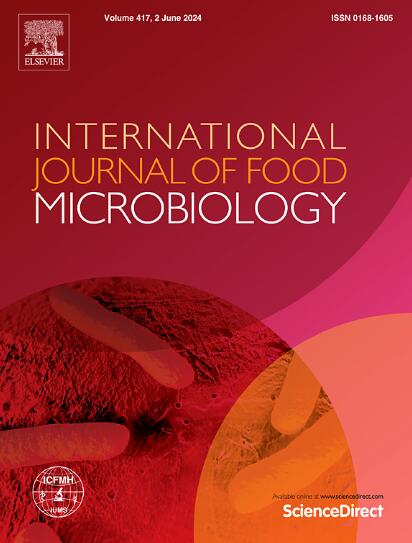Quantifying the impact of beer unit operations (mashing, fermentation, and maturation) on Bacillus thuringiensis behavior
IF 5.2
1区 农林科学
Q1 FOOD SCIENCE & TECHNOLOGY
International journal of food microbiology
Pub Date : 2025-07-22
DOI:10.1016/j.ijfoodmicro.2025.111361
引用次数: 0
Abstract
This study investigates the germination and survival of Bacillus thuringiensis strains during different stages of the brewing process, considering the impact of pH, hop concentration, and physicochemical parameters. Three B. thuringiensis strains carrying hop resistance genes (horA, horC, or both) were evaluated in Pilsner-style beer during mashing, fermentation, and maturation. Results showed that mashing was the most critical stage, with bacterial counts decreasing by over 5 log10 CFU/mL within 6–9 min, while fermentation and maturation allowed spore survival. Additionally, at pH 5.7, B. thuringiensis strain C:118 exhibited significant growth (p < 0.05), whereas strains C:002 and C:206 remained stable. Hop type and concentration influenced bacterial inhibition, with boiling enhancing antimicrobial activity, suggesting the release of bioactive compounds. However, some hop varieties lacked inhibitory effects against B. thuringiensis, highlighting the need for quality control measures beyond sensory attributes like bitterness. These findings confirm that spore-forming bacteria can persist throughout brewing and, depending on the final product composition, may germinate and proliferate under favorable conditions.
量化啤酒单元操作(捣碎、发酵和成熟)对苏云金芽孢杆菌行为的影响
本研究考察了苏云金芽孢杆菌菌株在酿造过程中不同阶段的萌发和存活,考虑了pH、啤酒花浓度和理化参数的影响。三株携带啤酒花抗性基因的苏云金芽孢杆菌菌株(horA, horC或两者都有)在比尔森啤酒中进行了捣碎,发酵和成熟过程的评估。结果表明,在发酵和成熟阶段,细菌数量在6-9 min内减少了5 log10 CFU/mL以上,这是最关键的阶段。此外,在pH 5.7下,苏云金芽胞杆菌C:118表现出显著的生长(p <;菌株C:002和C:206保持稳定。啤酒花的种类和浓度对细菌抑制作用有影响,煮沸可以增强其抑菌活性,表明啤酒花释放了生物活性化合物。然而,一些啤酒花品种缺乏对苏云金芽孢杆菌的抑制作用,突出了除了苦味等感官属性之外的质量控制措施的必要性。这些发现证实,孢子形成细菌可以在整个酿造过程中持续存在,并且根据最终产品成分,可能在有利条件下发芽和增殖。
本文章由计算机程序翻译,如有差异,请以英文原文为准。
求助全文
约1分钟内获得全文
求助全文
来源期刊
CiteScore
10.40
自引率
5.60%
发文量
322
审稿时长
65 days
期刊介绍:
The International Journal of Food Microbiology publishes papers dealing with all aspects of food microbiology. Articles must present information that is novel, has high impact and interest, and is of high scientific quality. They should provide scientific or technological advancement in the specific field of interest of the journal and enhance its strong international reputation. Preliminary or confirmatory results as well as contributions not strictly related to food microbiology will not be considered for publication.

 求助内容:
求助内容: 应助结果提醒方式:
应助结果提醒方式:


